Buying
| Newer Posts | Older Posts |
VHDA DELIVERS... How to use the $8,000 home buyer tax credit for your down payment and closing costs. |
|
 There has been talk for some time about using the $8,000 home buyer tax credit as a down payment or for closing costs, but the details have been few and far between. How, however, VHDA has created a specific program for this purpose, which makes it quite a bit easier... Instead of waiting until you file your taxes next year, you can receive the $8,000 tax credit at closing if you are obtaining your mortgage through the VHDA program. The $8,000 becomes a second mortgage with no interest and no payments for 12 months. Thus, the $8,000 loan costs you nothing, and stretches the loan of the money through the time when you'll get the tax credit. Providing even more flexibility, when you do get your $8,000 tax credit, you can either:
Click here for the full program flyer. | |
Listing Price --- It's All a Matter of Perspective |
|
 If you really think about it, the listing price of a house means ABSOLUTELY NOTHING --- regardless of what kind of a market we're in. Below are a few common conversations that explore this issue. BUYER: Well....this house is priced at $185,000 and we can't spend any more than $160,000 so we might as well not even go look at it. BUT WAIT: If the house is only worth $165,000 (and just happens to be priced at $185,000), then it would certainly be worthwhile looking at -- because when an offer comes in the owner might be reasonable about the actual value of the house. You need to know more than the asking price of the house --- you need to know what it's actually worth. BUYER: I really like this house, it's listed at $295,000 so perhaps we could offer $285,000? BUT WAIT: Don't base an offering price on the asking price! What if the house mentioned above was listed at $495,000 (and it was the same house) --- would you then offer around $480,000? The asking price is not necessarily an indication of market value, so take your cues from market values, not asking prices. BUYER: The house is listed at $225,000 and that seems like a good deal, but in this market, I'm not willing to pay any more than $215,000 for it. BUT WAIT: Really? What if the three most comparable properties in the city/county just sold for $250,000 --- and thus we are reasonable assured that the value is $250,000 (+/-) --- you'd really still only pay $215,000? SELLER: Let's list my house at $450,000 --- that's right about the price that all of my neighbors are asking for their houses. BUT WAIT: Regardless of whether the neighbors' houses are listed for $450,000 or $850,00, if they are selling for $350,000 then those sold houses should be the guide, not what is on the market now. These are just a few illustrations of the fact that the asking price of a house may mean absolutely nothing. Certainly there are times when the asking price is just at / above / below the market value (the price at which similar homes have recently sold) --- but that is not always the case. Beyond the asking price, you need to get comfortable with what the actual market value is of the houses you are considering. | |
If you're a first time home buyer, you'd better start looking more seriously now -- the clock is ticking! |
|
If, as a first time buyer, you close on your purchase of a home by November 30, 2009 you will receive an $8,000 tax credit on your 2009 taxes. That is to say that:
Most homes take 45 to 60 days to "close" -- in other words, it is usually 45 to 60 days after a house is under contract that the closing can take place. That means first time buyers ought to have their house under contract by September 30th in order to have time to close. And if you're planning to have a contract on a house before September 30th, NOW is the time to start looking. Lots of first time buyers are certainly in the market right now --- I'm working with quite a few, and I hear stories of many others as well who are buying --- but I believe there are quite a few other first time buyers who are still sitting on the bench. If you have questions about the $8,000 first time buyer credit, or if you're ready to start looking at properties, call (540-578-0102) or e-mail (scott@HarrisonburgHousingToday.com) me and we'll get started! | |
Exploring Home Value Trends in Harrisonburg and Rockingham County (again) |
|
The questions continue:
I'll be issuing my May report in the new few days, but in the meantime I thought I'd explore the big value questions again from a few perspectives. Here's what I found: Median Homes Prices Decline When now examining January through May, we see a median home value of $215,000 (still) for 2008, but a median value of $205,000 for 2009. How did we drop $10k when comparing Jan-Apr 2009 and Jan-May 2009? Smaller and less expensive homes sold in May 2009 (avg = $197k, 1906sf) as opposed to during the first four months of 2009 (avg = $240k, 2048sf). So....despite Jan-May 2009 median home prices being down compared to the same months in 2008, perhaps it is because smaller (and less expensive) homes are selling? Larger Home Market Outpaces Smaller Home Market The data above suggests that perhaps median home values are declining because smaller homes are selling right now. Not so fast! During Jan-May 2008, 39% of homes that sold had 1500 or fewer square feet. This declined in 2009 to only 35% of homes sold during Jan-May 2009. During Jan-May 2008, 21% of homes that sold had 2500 or more square feet. This increased in 2009 to 26% of homes sold during Jan-May 2009. These are relatively small differences, and they may not be significantly, but they refute the hypothesis that median home prices are declining because smaller homes are selling. Are First Time Buyers Procrastinating? The data above is a bit surprising to me --- I suspected that we would see an increase in "starter homes" (often less than 1500 square feet) because of the financial incentives currently available for first time buyers. The combination of an $8,000 tax credit, plus historically low interest rates is predicted to bring lots of first time buyers into the market. These first time buyers don't seem to have shown up in large numbers so far, based on the slower sales in the most affordable price range. Price Per Square Foot Declines As one last look at home values, I thought I'd take a look at the average price per square foot of the single family homes sold in Harrisonburg and Rockingham County in Jan-May 2008 versus Jan-May 2009. Last year we saw an average price per square foot of $130 during this time frame, as compared to $118 per square foot this January through May. Making it Actionable To obey my own imperative, here are a few thoughts on how this might affect you and your real estate decisions:
A far more detailed analysis of our local real estate market will be available in the next few days. Until then, wrestle with the data points above, and let me know if you have any related revelations or hypotheses. | |
I am impressed by my clients! |
|
Without a doubt, we're in a very challenging real estate market right now --- we've seen fewer and fewer home sales over the past several years. Thankfully, we haven't seen a significant decline in home values (as has been seen in most areas of the country) --- but it's still a difficult time to sell a home. Amidst this, it's great to be working with seller clients who are dedicated to working hard to do everything possible to sell their home:
| |
What do we mean by "Rent to Own"? |
|
The problem with "rent to own" is that everybody means something a little different by it. Here are some examples of what someone might mean when they are talking about a "rent to own" scenario:
| |
Exploring huge variances in Price Per Square Foot |
|
From a loyal blog reader... "I used your lovely search tool to look at all of the Belmont Estate listings. One thing that surprised me is the vast difference in the price per sq ft. Some were as low as $88 and others were as high as $139+. I'm curious to know why there's such a difference." An excellent question! Here's what she was noticing.... 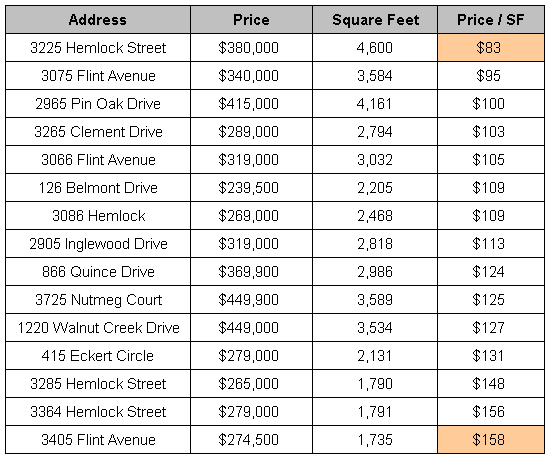 One reason for these differences is based on whether the homes have basements. You'll note (below) that the three homes without basements have a much higher price per square foot than all other homes in the neighborhood. What is really going on here is that when you start to add basement finished square footage into the "total livable square footage" (which is then used to calculate price per square foot) you are able to achieve a much lower price per square foot in a home with a basement. So....while the homes without basements seem to be really expensive on a price per square foot basis, it's really that the homes WITH basements are able to look less expensive using that metric. 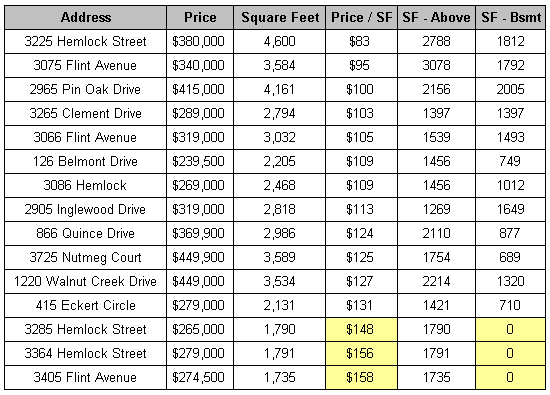 Another item to notice is that the largest homes (on a total livable square foot basis) are able to achieve the lowest price per square foot (see below). Three of the largest homes in this group have the lowest price per square foot. 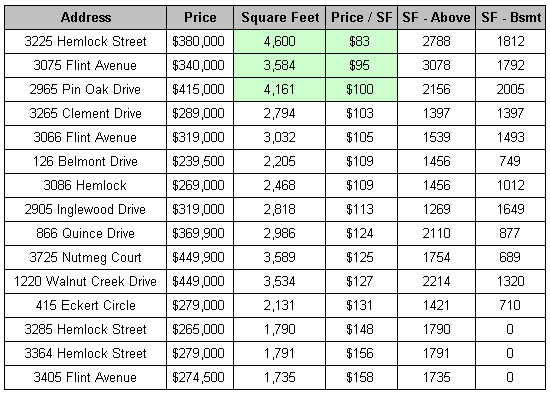 Given all of this, remember that it is best to compare relatively similar homes using the price per square foot metric. If some of the homes you are comparing have basements, and others do not, or if they are vastly different in total livable square feet, then you are likely to find significant a variation in the cost per square foot. | |
Buying real estate for your son or daughter to live in while they attend JMU |
|
 Many parents of JMU students consider buying a property in Harrisonburg for their son or daughter to live in while attending college. This can be a great financial alternative to paying several years of rent, especially if there is, or may be more than one student in a family attending JMU. But you can't just come to Harrisonburg, buy any property, and put your students and all of their friends into it. Here's what you need to know about buying houisng for your JMU student to live in with friends:
| |
Finding "that" house for sale in Harrisonburg |
|
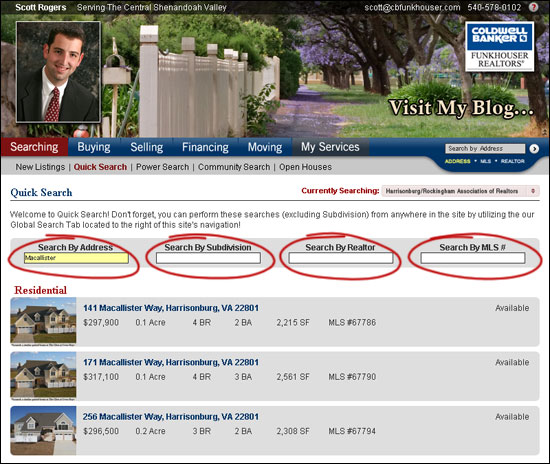 Are you ever looking for a house that is for sale with only one or two clues? If you only know the street name, subdivision, or Realtor's name, you'll have a difficult time finding the home on most web sites. Funny thing --- because if you're driving by a house you'll often only know one of these (rather essential) bits of information. As you can see above, I have accommodated for these frequent searches on my web site. You'll quickly be able to search for a property by its street name, subdivision, Realtor, or MLS number. A few notes.... Subdivision: This can be quite helpful as you explore a variety of neighborhoods where you are considering a purchase. Realtor: This search will allow you to search by any Realtor in our local MLS, not just those at Coldwell Banker Funkhouser Realtors. Try it out --- type in the name of a local Realtor and you'll see all of the properties they have listed for sale. Quick Search Tab: Don't forget you can also quickly search for a property by Address, MLS# or Realtor from anywhere on my web site using the Quick Search Tab in blue to the right of "My Services". If you have any suggestions for making your home search process even easier or faster, feel free to leave them in the comments below, call me at 540-578-0102, or e-mail me at scott@cbfunkhouser.com. | |
Benefits of $8,000 tax credit, record-low interest rates |
|
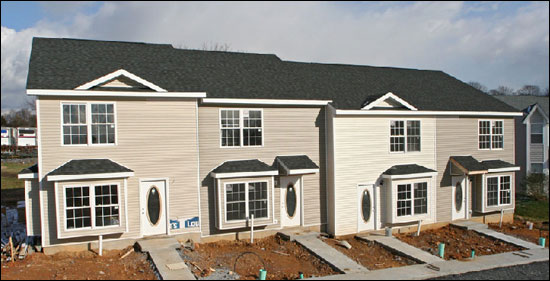 Let's assume for a moment that a first-time buyer decides to buy a $150,000 townhouse in Harrisonburg. With the appropriate income and credit scores, they may be able to obtain a rate as low as 4.625% on a 30 year fixed rate mortgage, with no downpayment. In the first year, this first-time buyer would likely have the following income and expenses:
Contrast this to a buyer who closes on December 1 of this year. At that point, the tax benefit will have ceased, and I predict that rates will be at least as high as 5.75% on a 30 year mortgage.
The combination of the tax credit, and the extremely low interest rates we are currently experiencing are likely to save you almost $9,000 in the first year of homeownership. As you can see, much of the above $9,000 of savings is in the $8,000 tax credit for first time buyers --- but the additional savings because of a low interest rate becomes quite dramatic over the course of the loan. Buying now at very low rates (4.625%) may save you as much as $37,000 over the next 30 years as compared to buying at 5.75%.
| |
How much can I negotiate off of a home's asking price? |
|
Over the past year in Harrisonburg and Rockingham County, 93% of all homes sold have sold within 10% of the seller's asking price. 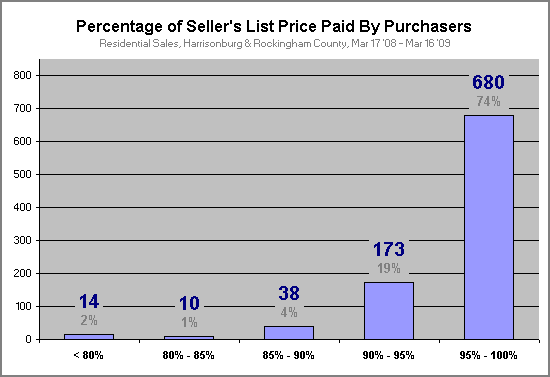 Given this market data, keep the following things in mind as you are considering making an offer on a home, or as you are considering pricing your home to sell:
Happy negotiating! | |
"Good Deals" on Investment Properties in Harrisonburg |
|
I met with a client earlier this week who has funds available to purchase an investment property, and we were contemplating what might make the most sense in the Harrisonburg. Here's what we came up with... Seek properties listed at prices under market value in neighborhoods (subdivisions) where it is easy to understand market value. If we consider, for a moment, townhouses and duplexes in the City of Harrisonburg --- we find that most of these properties are barely viable investment properties given their current market value and the rental income that they can generate. Most new-ish two-story townhomes in the City are selling between $155k and $165k, and might generate $850-$950 per month in rental income. When you consider 80% financing, insurance, taxes, association fees, you'll likely have (on average) $900 of rental income to offset (roughly) $900 of monthly expense. This "barely break even" scenario can make sense to some investors --- they are not only in it for the monthly cash flow, but also for the tax savings, principal reduction and appreciation. But consider this --- if you can purchase a townhome in one of these communities between $135k and $145k, the scenario can be quite different. Dropping the purchase price by $20k reduces your monthly obligations by approximately $110, which creates a nice buffer between income and expenses. Furthermore, you will likely be picking up some "instant equity" because you are buying below market value. A few important notes:
Feel free to call me (540-578-0102) or e-mail me (scott@cbfunkhouser.com) to get started. | |
The Importance of Knowing Thy Area of Expertise |
|
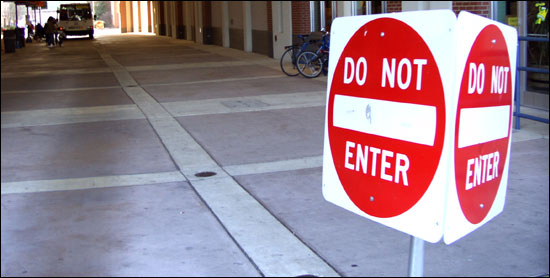 My main area of real estate expertise is in Harrisonburg and Rockingham County. I spend a lot of time assisting buyers and sellers in Harrisonburg and Rockingham County, and I also spend significant time analyzing the real estate market in these areas. Thus, I am very comfortable representing buyers and sellers in these areas. However, once I start venturing outside of Rockingham County, I know significantly less about market conditions, neighborhoods, available properties, etc. For that reason, if you are looking to buy or sell real estate in Augusta County, Page County, Shenandoah County, etc., etc., I will be helping to connect you to another Realtor in my company. Here's an example of the value of working with a Realtor in their area of expertise.... About a year and a half ago, my client bought a townhouse for approximately $135,000 that should have been priced around $165,000 or $170,000. The owner of the townhouse no longer lived in the area, so they didn't understand market conditions. Furthermore, the agent representing them was also located out of the area (a few counties north, if I recall correctly). Thus, the pricing was significantly off-base ($30K+ too low) --- AND the agent didn't have the property listed in our local MLS (thus, local Realtors didn't know about it). As a result, my clients were able to get a fantastic deal on the townhouse. Two funny points...
| |
Determining an offering price in today's market |
|
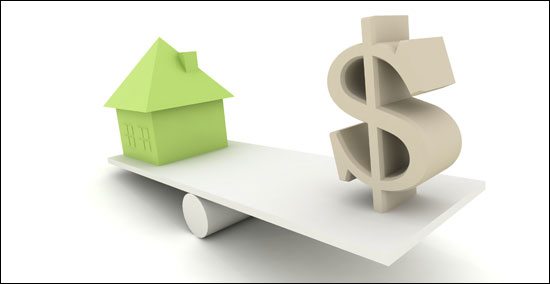 In making an offer to purchase a home, there are many small and large decisions to make (closing date, home inspection, closing cost credit, etc) --- but the decision that often has a 30-year impact is the offering price. A few short years ago (2003/2004), most buyers were offering at or very close to the asking price, as homes were "flying off the shelf" they were selling so fast. These days you'll typically have a bit more time to consider your offering price, which should include thoughts and discussions about... 1. Recent Sales Perhaps the most important of all factors, at what price have comparable homes recently sold? You likely won't want to pay too much more that the price for which other buyers have recently paid for similar properties. This is often much easier thought than analyzed, as there are many homes where it is difficult to find directly comparable home sales. 2. Competing Properties For Sale It is also important to reflect on the price you would pay if you bought an alternative house that is also for sale and that is reasonably similar to the house you are actually considering purchasing. If an owner is asking $250K for their home, even if other homes have recently sold around $250K, it would be important to know if three other comparable homes are currently for sale for $205K. 3. Seller's Acquisition Cost This information is not always available, and is not always pertinent, but it can guide conversations about an offering price. If two owners are both trying to sell their homes for $250K, and one bought their home for $150K and the other bought their home for $220K, the price you might offer on one house would be quite different than the second. Again, this is not always pertinent, as most owners won't want to sell their home at a price that they perceive to be under market value just because they can based on what they paid for it originally. 4. Length of Time on the Market Again, this won't always make an impact on the price that you will have to pay to purchase a particular home, but the owner of a home on the market for a week would see an offer of 85% of the asking price very differently than the owner of a home that has been on the market for two years. 5. Your Finances Perhaps the most important factor, you must make an offer at a price that is comfortable for you when it comes to the associated monthly housing costs. Sometimes this means making an offer which you suspect will not be accepted, but some financial/budgetary rationale must be inserted into the conversation at this point. There are many other ways to look at the asking price as you determine the offering price --- and indeed, each home sale scenario is different, so beyond this quick guide, determining the offering price warrants an in depth conversation. | |
Rent vs Own in Harrisonburg |
|
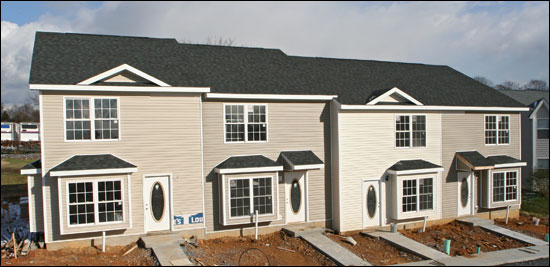 A common question I am asked is how costs compare in buying versus renting a "starter townhouse" in Harrisonburg. This changes over time, but here's how the costs compare now, assuming that you stay in the property for three years.... Buying a townhome at $156K (example) With a 3% down payment, you'll be financing $151,320, and at current interest rates (5.00%), this will equate to a $922 monthly mortgage payment. This $922 will include the principal, interest, taxes and insurance. You will likely pay $4,000 of closing costs to buy the townhome. During your three years of ownership you will have saved approximately $5,000 on your taxes because of the mortgage interest you have paid. After three years you will have paid off approximately $7,000 of principal on your mortgage. Thus, you have a net (unrealized) gain of $8,000 ($5k tax savings + $7k principal reduction - $4k closing costs). Renting a comparable townhome To rent a comparable townhome, you will likely be paying $900 per month. You will have no up front costs, no tax savings during your time of ownership, and no financial return at the end of the three year time frame. Three Year Conclusion If you are only going to live in your townhome for three years, you will still need to carefully consider whether you should buy vs rent. Even though you will have $8,000 of savings, you will burn through much of that in the transaction cost of selling your townhome. Five Year Conclusion If you're in the townhome for five years, it becomes a much better opportunity to have purchased. In the five year analysis, you will have a net (unrealized) gain of $17,000 ($9k tax savings + $12k principal reduction - $4k closing costs). Deciding whether to buy or rent is a big decision, but it can be made wisely with some basic financial analysis. Feel free to call (540-578-0102) or e-mail me (scott@cbfunkhouser.com) if you'd like some guidance for your personal situation. | |
Don't forget about the $7,500 tax credit |
|
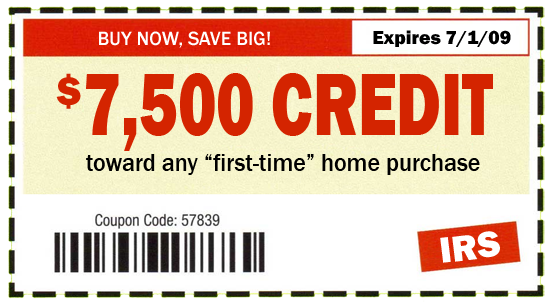 In talking to one of my clients today, he commented that he thinks a lot of potential buyers have forgotten all about the $7,500 tax credit. I agree! Here is a quick reminder of the basics... If you haven't owned a home in the past three years, you have a great opportunity to save $7,500 on your 2009 income taxes. To pull of this credit you'll need to buy a home before July 1, and you'll then be able to claim the $7,500 tax credit on your return that you would file at the beginning of next year. There is some fine print, available at the IRS web site, which includes the fact that you will be paying the $7,500 back over a 15 year period. It is rumored that the repayment aspect of this tax credit may disappear as a result of upcoming economic stimulus changes, and even if it doesn't, you still will have a net savings of over $4,000. | |
Buy a home now while you still have options! |
|
 It's December 30th, which means that we're less than 48 hours away from the largest inventory reduction that we've seen all year! OK --- perhaps I'm being a bit over-dramatic, but I predict that we will see a significant inventory drop as the calendar flips over from 2008 to 2009. Many listing agreements with hopeful home sellers were likely written with a December 31, 2008 expiration date, with a seller intending to try to sell until then end of the year and then re-evaluate. So...today, there are 778 residential properties for sale in Harrisonburg and Rockingham County. This includes single family homes, townhomes and condos. How many will still be on the market on January 1, 2009? Double check those available homes before the New Year rolls around before it's too late! :) | |
Buying and selling in this real estate market |
|
 As featured in the December Shenandoah Valley Business Journal... Absent hard data on the local real estate market, we could make erroneous assumptions by listening to national news stories. Here is a quick overview of how things stand in the Harrisonburg and Rockingham County real estate market: Are property values falling? No. The median sales price of all residential properties shows a 1% increase when comparing 2008 (Jan-Nov) to 2007 (Jan-Nov). Are buyers buying? Yes. However, it is at a significantly slower pace than last year. In 2007 we saw 1,182 residential sales (Jan-Nov) and this year we have only seen 861 sales (Jan-Nov). This indicates a 27% decline in market activity. Are sellers selling? Yes. Homes are selling at approximately the same pace as last year with an average "Days on Market" of 166 this year (Jan-Nov 2008) as compared to 171 last year (Jan-Nov 2008). Hopefully this draws out the realization that while the national housing market is not doing so well, our local housing market is a different story entirely. But yet, the state of our housing market isn't good news for everyone: A Buyer's Delight Buyers currently enjoy many housing choices, as the slow pace of sales provides for high inventory levels. Inventory levels have declined since September, and will likely continue to do so through the winter, yet current levels still provide buyers with many options for their next home purchase. The current slow rate of sales can allow for significant price negotiations in some instances. Even as median home sales prices stay steady, some sellers are ready to negotiate to provide for a faster sale instead of waiting for months amidst the masses of homes for sale. Buyers are also enjoying tremendously low interest rates, now below 5% again with many lenders for a 30-year fixed rate mortgage. The most recent time we have seen interest rates this low was in 2003. A Seller's Despair Despite no significant change in the time it has taken for homes to sell, high inventory levels equates to a long wait for many sellers. This can mean month after month of keeping a home ready to be shown, or it can equate to weeks or months of discouragement from a lack of showing activity. Buyers want to negotiate on price like never before, which means that not only do sellers need to price their homes competitively to attract market attention, they also need to still have room to adjust once negotiations begin. Many sellers of late find themselves balancing money and time as they consider a buyer's offer. Where We Go Next? As 2008 comes to a close, we still find ourselves in a buyers market, and we will likely see a similar market into the first and second quarter of 2009. We could start to see an across-the-board downward shift in home values, but if we were going to see a tremendous shift, I believe we already would have seen the start of it. One of my colleagues in the financial sector recently shared a great cliche about the housing market: "Most people get in too late, and they get out too late." As he pointed out, the second mistake has already been made by most. Don't let the first happen, too. | |
Got Lead? Here's what you need to know! |
|
 If you're buying a home built before 1978, you must know that your new home may very well have paint that contains lead (lead-based paint). This type of paint can be hazardous to your health -- especially if paint chips are ingested, or if dust from lead-based paint is breathed. Lead-based paint is more dangerous for children than adults because they are more likely to put their hands in their mouths, their bodies absorb more lead, and because their brains and nervous systems are more sensitive to the damaging effects of lead. So, what's a buyer to do? I have worked with buyer clients who decided not to buy a home built before 1978 because they didn't want to live with the possibility that lead might exist in the paint. If you see this issue in that way, it's probably not worthwhile to even go look at potential homes if they are built prior to 1978. Other clients that I have worked with are comfortable buying a home built before 1978, but thoroughly educate themselves on the risks and the precautions they should take. The principal fact to remember is that if you are engaging in renovations or remodeling that will disturb the paint (chipping, scraping, sanding), then you need to take precautions to protect yourself and your family. But what about the contract? An astute home buyer will realize that the sales contract allows them to test for lead. I haven't had a buyer engage in this testing, so I'm not too familiar with the process, but if you're buying a 1950's home, it wouldn't seem to me that you'd need to do testing to determine whether lead-based paint was present in the home. Additional Resources Here are some additional resources from the EPA that may be helpful for you.
| |
Offering to buy, or offering for sale, which comes first!? |
|
 So you want or need to buy a new house, but you must sell your current house before you can close on the new one. Do you wait to try to sell your house until you have a contract on a new house, or do you wait to make an offer on a new house until you have a contract on your current house? This is a bit of a puzzling question in the current market, and two of my clients are currently wrestling with this enigma. Option 1 - offer to buy first
| |
| Newer Posts | Older Posts |
Scott Rogers
Funkhouser Real
Estate Group
540-578-0102
scott@funkhousergroup.com
Licensed in the
Commonwealth of Virginia
Home Search
Housing Market Report
Harrisonburg Townhouses
Walk Through This Home
Investment Properties
Harrisonburg Foreclosures
Property Transfers
New Listings

